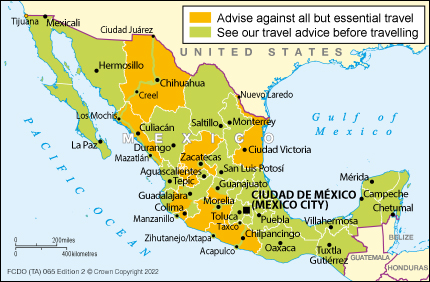Mexico
Summary

The Foreign, Commonwealth and Development Office (FCDO) advises against all but essential travel to:
The state of Chihuahua except:
- The city of Chihuahua
- The border crossing in Ciudad Juárez (accessed by federal toll road 45)
- Federal toll road 45D connecting the cities of Chihuahua and Ciudad Juárez
- The Copper Canyon rail route to/from Chihuahua and towns immediately on this route including Creel
- The road from Creel via San Juanito to San Pedro
- State highway 16 from San Pedro to Chihuahua
UPDATE: On 5th January there were reports of gunfire in multiple locations in the state of Sinaloa, including Culiacán, los Mochis and Guasave. Visitors should follow the advice of local authorities.
The state of Sinaloa except:
- The cities of Los Mochis and Mazatlán
- Road 32 that runs between El Fuerte and Los Mochis
- The 15D federal toll road that runs the length of the state
- The Copper Canyon rail route to/from Los Mochis/El Fuerte and the towns immediately on this route
The state of Zacatecas except:
- Zacatecas City accessed by air
The state of Tamaulipas except:
- The border crossing at Nuevo Laredo accessed by federal toll road 85D from Monterrey
The state of Colima except:
- The city of Manzanillo reached by sea or air via the Manzanillo-Costalegre International Airport
The state of Guerrero except:
- The city of Acapulco accessed by the 95D federal toll road
- The town of Zihuatanejo/Ixtapa accessed by air
- The town of Taxco accessed by the 95D and 200D federal toll roads
The state of Michoacán except:
- The city of Morelia accessed by federal toll roads 15D, 126 and 43
- The town of Pátzcuaro accessed by federal toll roads 14D and 15 from Morelia.
- The 15D toll road
The Foreign, Commonwealth and Development Office (FCDO) also advises against all but essential travel to the following areas within these states:
In the state of Baja California:
-
the city of
TijuanaTijuana,in- Airside transit through Tijuana airport
- The Cross Border Xpress bridge from the airport linking terminals across the Mexican-US border.
- The federal toll road 1D and Via Rápida through Tijuana to the border
-
the city of Tecate in Baja California (including roads between Tijuana and Tecate)
(Note: FCDO does not advise against all travel or all but essential travel to any part of the state of Baja California Sur.)
In the state of Guanajuato:
- the areas south west of the road 45D
In the state of Jalisco:
- the areas south and southwest of Lake Chapala to the border with the state of Colima
- the northern municpalities of Hostotipaquillo, San Martin de Bolaños, Chimaltitán, Bolaños, Totatiche, Colotlán, Santa Maria de los Ángeles, Huejúcar, Villa Guerrero, Mezquitic and Huequilla el Alto
If you are considering travel to any of these areas please see our Safety and security section for more detailed information on the risks present
Before you travel, check the ‘Entry requirements’ section for Mexico’s current entry restrictions and requirements. These may change with little warning. Monitor this advice for the latest updates and stay in contact with your travel provider.
If you plan to pass through another country to return to the UK, check the travel advice for the country you’re transiting.
The hurricane season normally runs from June to November and affects both the Pacific and Atlantic coasts. Be aware that effects of tropical storms and hurricanes can span hundreds of miles from the centre of the storm, causing flooding, landslides and disruption to local services, including transport. You should follow the advice of the local authorities. See Natural disasters
It is more important than ever to get travel insurance and check it provides sufficient cover. See the FCDO’s guidance on foreign travel insurance.
The land border between the US and Mexico is open for travellers going to the US who have been vaccinated with WHO approved COVID vaccines. See Entry requirements.
You do not have an automatic right to the 180-day maximum stay possible for tourists. You should refer to the stamp received on your passport in the “Temporalidad” section to check the duration you have been granted. The Mexican authorities have the right to detain individuals who exceed the duration of stay granted.
Over 500,000 British nationals visit Mexico every year. Most visits are trouble-free. Make sure you carry ID and relevant immigration documents with you at all times. See Local laws and customs.
The security situation can pose a risk for foreigners. Be alert to the existence of street crime as well as serious violent crime like robbery, assault and vehicle hijacking. Do not become involved with drugs of any kind. Drug related crime and violence is prevalent and is on the increase. You should take particular care to avoid being caught up in violence between criminal groups. See Crime and Violence.
The Mexican government makes efforts to protect major tourist destinations. However, since the beginning of 2021, there have been several clashes between rival criminal gangs in popular tourist destinations in Cancun and surrounding areas. While tourists have not been the target, anyone in the vicinity of an incident could be affected. See Main tourist destinations.
Protests regularly affect Mexico City and other parts of the country. You should avoid demonstrations and follow the advice of the local authorities if you’re in an area where a protest is taking place. See Political situation
Although there’s no recent history of terrorism in Mexico, attacks can’t be ruled out. See Terrorism
If you’re abroad and you need emergency help from the UK government, contact the nearest British embassy, consulate or high commission.